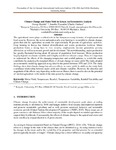| dc.description.abstract | The agricultural sector plays a critical role in the Kenyan economy in terms of employment and
food security. However, the sector and particularly crop farming is vulnerable to climate change,
given that rain fed agriculture accounts for approximately 98 percent of agricultural activities.
Crop farming in Kenya has limited diversification and maize production iscritical. Maize
production forms a strong base to food security, employment, income generation, poverty
alleviation, as well as economic growth and development. This notwithstanding, maize production
has greatly fluctuated leaving about 40 percent of population food insecure. Maize production
largely depends on climate variables and is highly sensitive to climate change. Thus, it is important
to understand the effects of the changing temperature and rainfall patterns, to which this study
contributes by analyzing the marginal effects of climate change on maize yield. The study adopted
an econometric modeling approach using data for the period between 1970 and 2014. The study
findings show that climate change has adverse effects on maize yield. In addition, the study finds
a nonlinear relationship between maize yield and climatic variables. However, the direction and
magnitude of the effects vary depending on the season. Hence, there is need to elevate the potential
of rain fed agriculture in the midst of the risks posed by climate change.
Keywords: Maize Yield, Temperature, Rainfall, Temperature Variability, Rainfall Variability and
Climate Change. | en_US |

